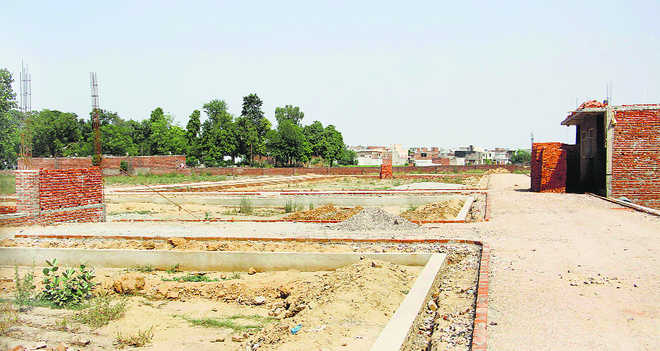
An illegal colony in Jalandhar. Photo: Sarabjit Singh
Ruchika M Khanna
On a course correction?
The Bill pertaining to the regularisation of colonies fell flat. Now, the govt is trying to come up with an all-inclusive new policy
Ruchika M Khanna in Chandigarh
The Punjab Cabinet announced The Punjab Laws (Special Provisions for Regularisation Authorised Colony) Bill, 2018, with much fanfare in March earlier this year. It was the first major step initiated towards regulating unauthorised colonisation in urban areas of the state. However, the policy drew a blank, with colonisers and those having plots in these illegal colonies rejecting it.
The three previous policies, brought out by the Akali-BJP government in 2013, 2014 and 2016, had enjoyed a good response from the people living in these illegal colonies. Official data from the housing department reveals that as many as 6,662 applications were received for the regularisation of colonies, of which 3,377 fell within the municipal limits. As many as 2,565 colonies (of total 6,662) were approved for regularisation, and NoCs were issued to them. The state government had managed to collect around Rs 840 crore through these three policies, as compounding fee, to be used for providing basic amenities within the colonies that opted to avail the schemes.
On the other hand, not a single coloniser came forward to get his unauthorised colony registered, forcing the Punjab Government to keep the policy in abeyance. It’s not that the people residing in these 7,000-odd identified illegal colonies do not want access to regular basic civic amenities like water supply, sewerage, electricity and road connectivity. What made the policy “unattractive” to them was the decision to ensure that both the colonies as well as the plot holders in these unauthorised colonies get regularised.
In simple economic terms, the policy announced in March said the colonisers would have to pay a composition fee of Rs 3 lakh to Rs 20 lakh per acre, depending on how many built up plots exist in a colony. Also, the colonisers do not wish to leave 45 per cent open spaces for roads and other facilities, as mandated in the new policy.
Major Singh, president of the Confederation of Real Estate Developers’ Associations of India, Jalandhar, said that the colonisers want a policy similar to the previous three policies, where individual plot holders should get their plots as well as built up structure regularised by paying development charges and regularisation fee. “Many of the colonisers, who developed these colonies, sold the plots long ago and at much cheaper prices. They can’t be held accountable now and made to pay such high composition fee,” he said.
Thus, the exercise to frame a new policy has been initiated once again. “Our idea was to ensure planned development even in these colonies. Since no one has come forward, I am making amendments to the policy by bringing all ministers representing urban areas and all officers, who have worked in the housing department for 10 years. I will then be taking the new draft to the colonisers and plot holders to seek their comments. By July 15, the final policy will be ready,” said Housing Minister Tript Rajinder Singh Bajwa.
What does the new policy say
About planning in these colonies, The Punjab Laws (Special Provisions for regularisation authorised colony) Bill, 2018, states
- The government will provide services based on collection of funds under this policy. Urban Local Bodies is not bound to provide services and infrastructure beyond the funds collected from the individual colony.
- Illegal colonies are categorised into four to be considered for regularisation:
- Where upto 25 per cent of plots are built up, no road should be less than 20 feet; approach road should be between 35 & 60 feet.
- Where above 25 per cent to 50 per cent plots are built up —unsold area to be utilised for providing 25 per cent area under parks, open spaces, water supply, sewerage, roads, etc. Road width should be between 15 & 20 feet.
- Where above 50 per cent of plots are built up — road width should be between 15 and 20 feet; open space of 50x50 feet for water supply pump house and 50x50 feet for park should be there.
- Special provisions for exceptional colonies (special committees to be set up for special category colonies as road width is less than 15 feet).
Here’s how PAPRA defines urban planning
- Width of access road shall not be less than 35 feet, width of internal roads not less than 25 feet.
- Minimum land reserved for roads, open spaces, schools and public and community buildings and other common purposes should not be less than 35 per cent. Also include a site for water works and sewerage treatment plant.
Who pays what
Composition fee is Rs 3 lakh to Rs 20 lakh per acre, to be paid only by the coloniser. Plot holders have to pay development charges. In case the building has been constructed, they need to pay the regularisation fee.
Fact check
Contrary to the response generated by the Congress government’s regularisation policy, the last three policies, framed by the Akali-BJP government in 2013, 2014 and 2016, enjoyed good response from people living in illegal colonies. Here is a breakup:
6,662 Colonies seeking regularisation
2,565 Approved for regularisation
3,80,912 Plot holders who applied for regularisation
3,33,634 Plots approved
Rs 840 crore Money collected by the state government as compounding fee; to be used for providing basic amenities within the colonies that opted to avail the schemes



























